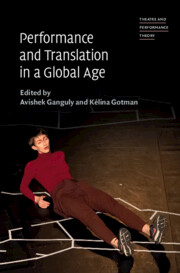Book contents
- Performance and Translation in a Global Age
- Theatre and Performance Theory
- Performance and Translation in a Global Age
- Copyright page
- Contents
- Figures
- Contributors
- Acknowledgements
- Introduction
- Part I Translation as Medium and Method
- Part II Translation, Nation-state and Post-nationalism
- Chapter 6 Transembodiment as Translation
- Chapter 7 Translating Triumph
- Chapter 8 From Novella to Theatre and Opera
- Chapter 9 Gestural Archives
- Part III ‘Translation at Large’: Dialogues on Ethics and Politics
- Works Cited
- Index
Chapter 8 - From Novella to Theatre and Opera
Translating ‘Otherness’ in Cavalleria rusticana
from Part II - Translation, Nation-state and Post-nationalism
Published online by Cambridge University Press: 10 August 2023
- Performance and Translation in a Global Age
- Theatre and Performance Theory
- Performance and Translation in a Global Age
- Copyright page
- Contents
- Figures
- Contributors
- Acknowledgements
- Introduction
- Part I Translation as Medium and Method
- Part II Translation, Nation-state and Post-nationalism
- Chapter 6 Transembodiment as Translation
- Chapter 7 Translating Triumph
- Chapter 8 From Novella to Theatre and Opera
- Chapter 9 Gestural Archives
- Part III ‘Translation at Large’: Dialogues on Ethics and Politics
- Works Cited
- Index
Summary
This chapter examines what it meant to perform translation in Cavalleria rusticana. It examines: 1) the original novella written by Giovanni Verga in 1880; 2) the 1884 stage version adapted by the author and interpreted by a variety of star actors, including Eleonora Duse and the Sicilian dialect players; and 3) the 1890 operatic version composed by Pietro Mascagni and performed by celebrity sopranos, such as Emma Calvé. Through close examination of newspaper reviews and early accounts, it is argued that performing translation meant generating and circulating an exoticized ‘brand’ of Sicilian-ness in and outside the Italian peninsula shortly after political unification in 1861. This chapter thus offers new perspectives into questions of racial stereotypes, and a provides basis for new insights into the Sicilian dialect players, in particular, who, pioneering a physical and bodily form of communication, transcended language barriers and mediated the foreign text through a kind of translation that went beyond the written word.
Keywords
- Type
- Chapter
- Information
- Performance and Translation in a Global Age , pp. 186 - 200Publisher: Cambridge University PressPrint publication year: 2023

